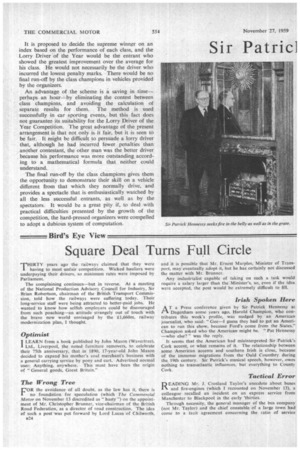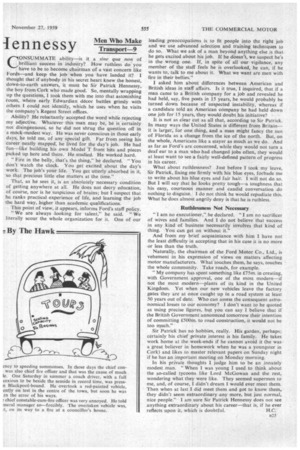Sir Patric] iennessy
Page 32

Page 33

If you've noticed an error in this article please click here to report it so we can fix it.
CONSUMMATE ability—is it _ a sine qua non of brilliant success in industry? How ruthless do you have to be to become chairman of a vast concern like Fords—and keep the job when you have landed it? I thought that if anybody in his secret heart knew the honest, down-to-earth answers, it must be Sir Patrick Hennessy, the boy from Cork who made good. So, mentally wrapping up the questions, I took them with me into that astonishing room, where early Edwardian decor battles grimly with others I could not identify, which he uses when he visits the company's Regent Street offices.
Ability? He reluctantly accepted the word while rejecting .my adjective. Whatever this man may be, he is certainly not disingenuous, so he did not 'shrug the question off in 'a mock-modest way. He was never conscious in those early days, he told me, of any special gift. Far from seeing his career neatly mapped, he lived for the d'ay's job. He had fun—like building his own Model T from bits and pieces picked up here and there. He studied. He worked hard.
"Fire in the belly, that's the thing," he declared. "You don't watch the clock. You gel excited. about the day's work. The job's your life. You get utterly absorbed in it, so that precious little else matters at the time."
That, as he sees it, is an absolutely necessary condition of getting anywhere at all. He does not decry education, of course, nor is he suspicious of brains; but I suspect that he ranks practical experience of life, and learning the job the hard way, higher than academic qualifications.
This point of view, it appears, informs Ford's staff policy. "We are always looking for talent," he said. "We literally scour the whole organization for it. One of our
leading preoccupations is to fit people into the right job and we use advanced selection and training techniques to do so. What we ask of a man beyond anything else is that he gets excited about his job. If he doesn't, we suspect he's in the wrong one. If, in spite of all our vigilance, any member of the staff feels he is overlooked, he can, if he wants to, talk to me about it. What we want are men with fire in their bellies."
I asked him about differences between American and British ideas in staff affairs. Is it true, I inquired, that if a man came to a British company for a job and revealed he had held, say, five posts in 15 years, he would probably be turned down because of suspected instability, whereas if a candidate told an American company he had held down one job for 15 years, they would doubt his initiative? • It is not as clear cut as all that, according to Sir Patrick. Iii many ways the United States is different from Britain— it is larger, for one thing, and a man might fancy the sun of Florida as a change from the ice of the north. But, on the whole, Americans like a stayer as much as we do. And as far as Ford's are concerned, while they would not turn a deaf ear to a man who had changed jobs often, they would at least want to see a fairly well-defined pattern of progress in his career.
What about ruthlessness? Just before I took my leave, Sir Patrick, fixing me firmly with his blue eyes, forbade me to write about his blue eyes and fair hair. I will not do so. But I will say that he looks pretty tough—a toughness that his easy, courteous manner and candid conversation do nothing to disguise. I do not think he would repudiate this. What he does almost angrily deny is that he is ruthless.
Ruthlessness Not Necessary "I am no executioner,", he declared. "I am no sacrificer of wives and families. And I do not believe that success in any kind of business necessarily involves that kind of thing. You can get on without it."
And from my brief acquaintance with him I have not the least difficulty in accepting that in his ease it is no more or less than the truth.
Naturally, the chairman of the Ford Motor Co., Ltd., is vehement in his expression of views on matters affecting motor manufacturers. What touches them, he says, touches the whole community. Take roads, for example.
"My company has spent something like £75m. in creating, with Government approval, one of the most modern—if not the most modern—plants of its kind in the United Kingdom. Yet when our new vehicles leave the factory gates they are at once caught up in a road system at least 50 years out of date. Who can assess the consequent astronomical losses to our economy? I don't want to be quoted as using precise figures, but you can say I believe that if the British Government announced tomorrow their intention of committing £500m. to road construction, it would not be too much."
Sir Patrick has no hobbies, really. garden, perhaps; certainly his chief private' interest is his family. He takes work home at the week-ends if he cannot avoid it (he was a great believer in homework when he was a youngster in Cork) and likes to master relevant papers on Sunday night if he has an important meeting on Monday morning.
In his private thoughts I judge him to be an innately modest man. "When I was young I used to think about the so-called tycoons like Lord McGowan and the rest, wondering what they were like. They seemed supermen to me, and, of course, I didn't dream I would ever meet them.
Then when at last I did meet them and got to know them, they didn't seem extraordinary any more, but just normal, nice people." I am sure Sir Patrick Hennessy does not see anything extraordinary about his career—that is, if he ever reflects upon it, which is doubtful. H.C.
















































































































